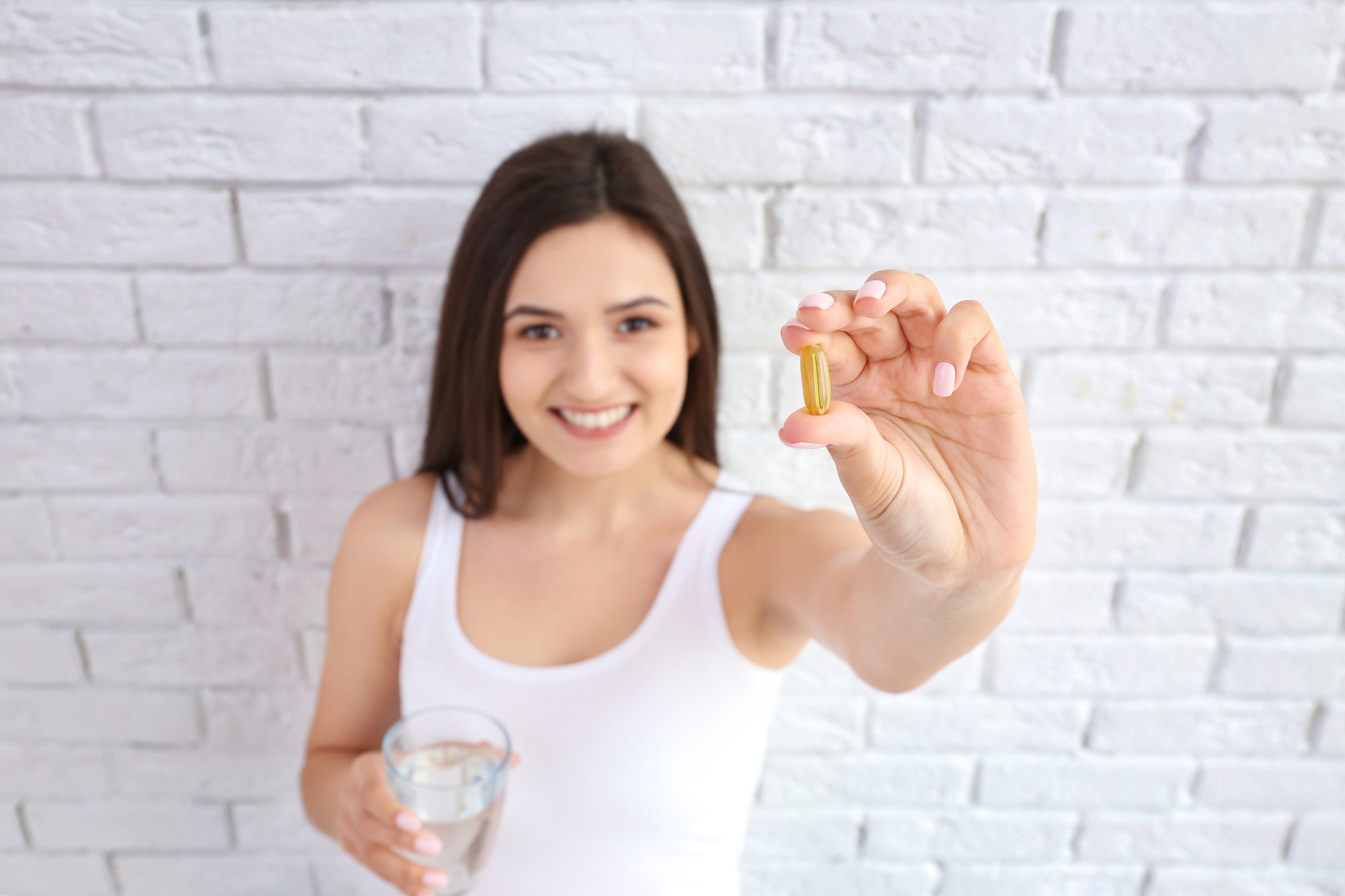Your cart is empty. Let's fix that!


Starting a family is an exciting time, but also a busy one with so many new items on the agenda. One of those items is getting the proper nutrients, especially important at this lifestage. When you are pregnant or trying to conceive, it’s more critical than ever to focus on your own wellness and how that can help your growing baby.
DHA is an essential nutrient for healthy growing minds and bodies and it is found in every cell of our bodies. DHA is critical to many important functions, especially in the brain and eyes. DHA plays a big role in early brain growth and development.
DHA is short for docosahexaenoic acid. It is a long-chain polyunsaturated fatty acid in the omega-3 fatty acid family. Omega-3 fatty acids include EPA and DHA, but when it comes to brain health, DHA “rules.” The human brain is made up of nearly 60% fat, and DHA is the predominant fatty acid found in the brain (1,2).
DHA and EPA are both “essential” fatty acids, which means that the body cannot make them on its own, and they must be consumed through dietary sources.
DHA is a primary structural component of the human brain, cerebral cortex, skin, and retina. DHA regulates neurogenesis (formation of new brain cells called neurons), neurotrophic factor (regulates the growth of neurons), and synaptogenesis (formation of connections between neurons). Because it makes up the cell membrane and affects cell structure in postsynaptic neurons, it plays a role in releasing serotonin in the brain and important functions, such as sleep, memory, mood, and behavior (3-5).
DHA accumulates in the centers of the brain involved in memory and attention. In a study published in the Medical Journal of Clinical Nutrition, researchers found that healthy adults who consumed 1.16 grams of DHA per day for 6 months, significantly supported both their memory and reaction time (7). A recent study published in the journal Cerebral Cortex showed that supplementing with 2.2 grams of DHA and EPA per day supported brain function (8). What’s more, using neuroimaging, the researchers found that supplementation supported the composition of the participants’ brains.
DHA is most critical for women of childbearing age due to the essential role DHA plays in growth and development. This is true when you are trying to reach your fertility goals, as well as during and post-pregnancy. DHA, as an omega-3 essential fatty acid, is vital for the neurodevelopment of your baby’s brain, spinal cord, and eyes. DHA helps support your mood, sleep, and memory for a healthy pregnancy. Seeking out the best prenatal DHA is important to your overall prenatal plan. Along with a prenatal multivitamin, look for a prenatal DHA supplement.
Yes, you can. When you are thinking about a healthy pregnancy diet or fertility health diet, including good sources of dietary DHA should be on the menu. Unfortunately, DHA intake and levels in women in the United States are amongst the lowest in the world. Our U.S. food supply is largely void of DHA due to over-consumption of vegetable oils which contain inflammatory omega-6 fatty acids (e.g., soybean, safflower, sunflower, corn, canola, cottonseed), meat from feedlot animals (that consume abundant amounts of soy and corn), and not consuming enough of these important omega-3 fatty acids (6).
There are good dietary sources. Most people equate salmon with omega-3 fatty acids. In addition to wild salmon, other whole food sources of DHA and EPA include:
Other food sources include cod liver oil, sardines, and pasture-fed organic butter or ghee (these are also high in vitamin D3). If you are vegan, plant sources of omega-3 include flax, chia, hemp, and walnuts.
Marine animals such as fish and krill, which provide EPA and DHA, are mostly promoted for their protective effects on your heart. Flaxseed, chia, hemp, and a few other foods, on the other hand, offer alpha-linoleic acid (ALA).
When choosing fatty fish as your best sources of DHA and EPA, it’s important to choose wild-caught fish from a trusted source to ensure that you get the highest levels of omega-3 fatty acids and the lowest levels of heavy metals (e.g., mercury). Purity matters. This is why it’s recommended to supplement with a high-quality fish oil supplement daily.
Best Nest Wellness makes an omega-3 supplement to meet these needs.
Yes, you can. Despite the fact that fatty fishes are the most commonly listed DHA food sources, omega-3s don’t only come from fish oil. Algae is an ideal, sustainably-sourced vegan alternative that provides all of the vital DHA needed for your baby’s neurodevelopment.
There are other plant sources of omega-3s such as flax, chia, hemp, and walnuts, however these sources contain omega-3s in the form of alpha-linolenic acid (ALA) which must be converted. This conversion is not a simple or efficient metabolic process. SInce the conversion rate is low, you would have to eat unrealistically high quantities to get enough DHA. More direct sources such as algae are more efficient.
DHA is often put into a prenatal vitamin. But did you know that that form of DHA is often made from ethyl esters? Ethyl esters are a form of DHA that is made during the purification process. It turns into alcohol when metabolized by the body. Alcohol is something you want to avoid if you are pregnant.
Best Nest Wellness makes a prenatal DHA in the triglyceride form, which is the form of DHA that is closest to its natural state, just purified and free of mercury. You can’t compact it like you can an ethyl ester. For that reason, you can’t fit it into a multivitamin which is why we developed specific supplements like Prenatal DHA designed to support your DHA needs.
Most prenatal vitamins that include DHA don't come from the best source. They use synthetic ethyl esters because they can be compressed. Plus, they also don't use optimal amounts. The reason that we do not combine DHA with our multivitamins is that the minimum amount of DHA recommended by the March of Dimes is 200mg and this cannot be squeezed into a multi.
To provide expectant moms with the right amount and type of DHA, we needed to make a separate easy-to-swallow softgel. Like our prenatal vitamins, our DHAs are made from the highest quality ingredients available.
We also understand the need to have prenatal DHA vegan sources. Crafted for pregnant and lactating mothers, Vegan Prenatal DHA is a purified vegan DHA made from sustainable algae.
Choline makes the neurotransmitter acetylcholine, the most common chemical messenger needed for cell-to-cell communication. It plays an important role in attention and memory.
In addition to the role of choline in general physiology, choline is critically important during pregnancy (9). Research has found an important interaction between DHA and choline; they work together like a dynamic duo.
Choline and DHA are two important lipid-based nutrients needed for growth and development. Findings from in vitro studies highlight potential interactions between both nutrients and effects on metabolism. For example, DHA supplementation significantly increased cellular choline uptake in human retinal cells compared to cultured cells without supplemental DHA, which demonstrates how DHA may impact choline status (10).
As you navigate this exciting, yet sometimes challenging, time of life, one thing that can help is caring for yourself and taking active steps to support your growing nest. Look for key nutrients in prenatal vitamins and seek out the things that you know support your wellbeing and bring you joy. Along with essential nutrients like DHA and choline, advanced prenatal mutivitamins with active methylated vitamins can be part of your plan for a healthy pregnancy.
(1) Chang C-Y, Ke D-S, Chen J-Y. Essential fatty acids and human brain. Acta Neurol Tiwanica. 2009;18(4):231-241.
(2) Crawford MA, Bloom M, Broadhurst CJ, et al. Evidence for the unique function of docosahexaenoic acid during the evolution of the modern hominid brain. Lipids. 1999;34 Suppl:S39-S47.
(3) Hibbeln JR, Nieminen LRG, Blasbalg TL, Riggs JA, Lands WEM. Healthy intakes of n-3 and n-6 fatty acids: estimations considering worldwide diversity. Am J Clin Nutr. 2006;83(6 Suppl):1483S - 1493S.
(4) Hibbeln JR, Ferguson TA, Blasbalg TL. Omega-3 fatty acid deficiencies in neurodevelopment, aggression and autonomic dysregulation: opportunities for intervention. Int Rev Psychiatry abingdon Engl. 2006;18(2):107-118. doi:10.1080/09540260600582967.
(5) Parker G, Gibson NA, Brotchie H, Heruc G, Rees A-M, Hadzi-Pavlovic D. Omega-3 fatty acids and mood disorders. Am J Psychiatry. 2006;163(6):969 doi:10.1176/appi.ajp.163.6.969.
(6) Blasbalg TL, Hibbeln JR, Ramsden CE, Majchrzak SF, Rawlings RR. Changes in consumption of omega-3 and omega-6 fatty acids in the United States during the 20th century. Am J Clin Nutr. 2011;93(5):950-962. doi:10.3945/ajcn.110.006643.
(7) Stonehouse W, Conlon CA, Podd J, et al. DHA supplementation improved both memory and reaction time in healthy young adults: a randomized controlled trial. Am J Clin Nutr. 2013;97(5):1134-1143.doi:10.3945/ajcn.112.053371.
(8) Witte AV, Kerti L, Hermannstådter HM, et al. Long-chain omega-3 fatty acids improve brain function and structure in older adults. Cereb Cortex N Y N 1991. 2014;24 (11):3059-3068. doi:10.1093/cercor/bht163.
(9) Choline and DHA in Maternal and Infant Nutrition: Synergistic Implications in Brain and Eye Health, Nutrients, Published online 2019 May 21. doi: 10.3390/nu11051125, PMCID: PMC6566660.
(10) Effect of docosahexaenoic acid on membrane fluidity and function in intact cultured Y-79 retinoblastoma cells. Arch. Biochem. Biophys. 1992;294:564–570. doi: 10.1016/0003-9861(92)90726-D.